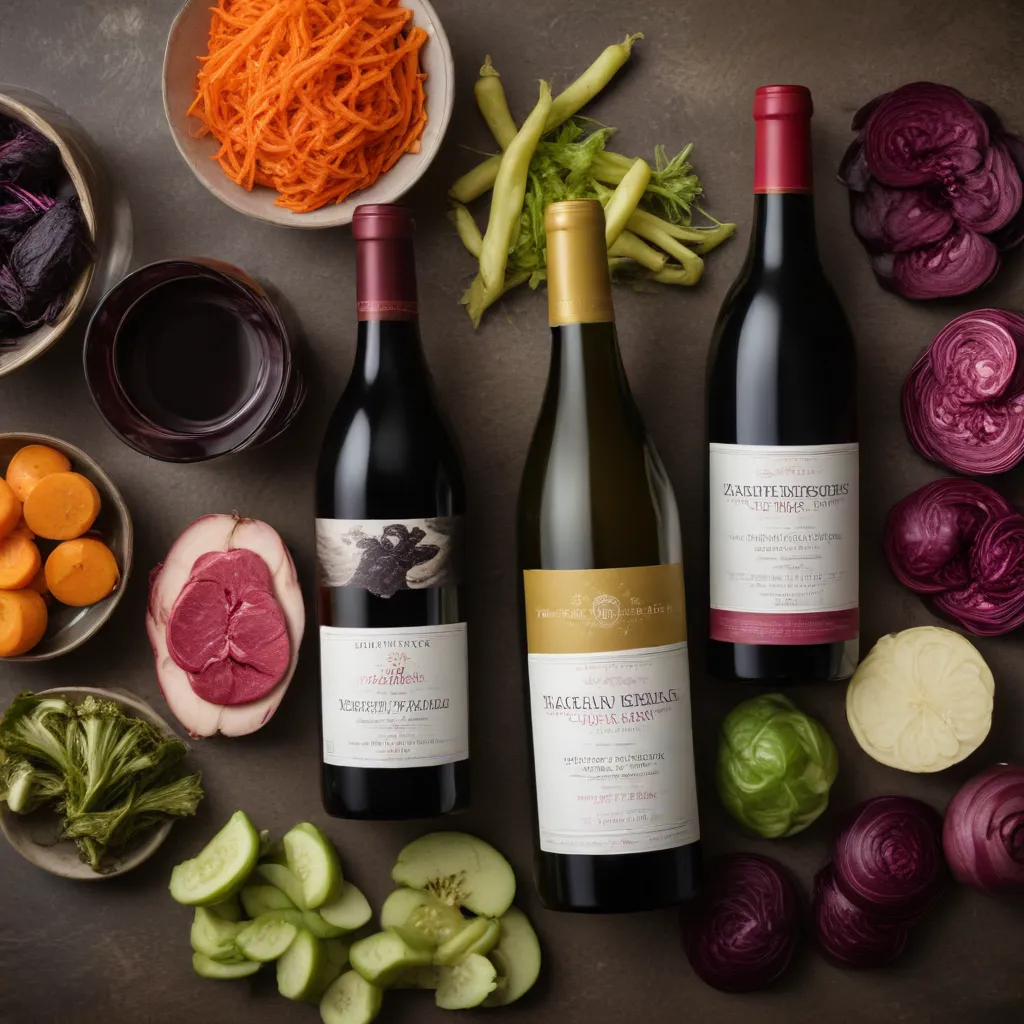
The world of fermented vegetables and wine is a fascinating culinary landscape waiting to be explored. These two powerhouses of flavor can come together in harmonious pairings, elevating the dining experience and unlocking a symphony of tastes. As a hospitality and wine expert for the Wine Garden Inn, I’m thrilled to guide you through the art of matching these distinct yet complementary ingredients.
The Fundamentals of Fermented Vegetables
Fermented vegetables are a treasure trove of complex flavors, unique textures, and unparalleled nutritional benefits. These are the result of a natural preservation process where beneficial bacteria, such as lactobacilli, transform the sugars and starches in vegetables into lactic acid. This not only extends the shelf life of the produce but also imbues it with a tantalizing depth of flavor.
The varieties of fermented vegetables are vast and diverse, ranging from the tangy and crunchy sauerkraut to the sweet and earthy kimchi, the pungent pickled onions, and the umami-rich miso. Each of these offers a unique set of flavor profiles and textural experiences that can be expertly paired with the right wine.
The Essence of Wine
Wine, on the other hand, is a complex beverage that reflects the terroir, grape variety, and winemaking techniques used in its production. From the bright and zesty Sauvignon Blanc to the rich and robust Cabernet Sauvignon, the wine world encompasses a diverse range of styles and flavor profiles.
At the heart of wine’s complexity lies its acidity, which serves as the backbone, providing a refreshing counterpoint to the flavors. Additionally, the presence of tannins – those astringent compounds derived from grape skins, seeds, and oak – can lend structure, depth, and a satisfying mouthfeel to the wine.
Bridging the Gap: Pairing Fermented Vegetables with Wine
The key to pairing fermented vegetables with wine lies in understanding the flavor compatibility, texture and mouthfeel harmony, and the interplay between the acidity and tannins of both the produce and the wine.
Flavor Compatibility: When it comes to pairing, consider the dominant flavors of the fermented vegetables – whether they are savory, sour, or umami-rich. These flavors should complement or contrast with the wine’s inherent characteristics, creating a delightful synergy on the palate.
Texture and Mouthfeel Harmony: The interplay between the crunch of fermented vegetables and the varying textures of wine, from the silky smoothness of a Pinot Noir to the robust, full-bodied mouthfeel of a Syrah, can make or break a pairing.
Complementing Acidity and Tannins: Fermented vegetables often exhibit a pronounced acidity, which can be beautifully balanced by a wine’s own acidity, or it can be contrasted by a wine with softer, more rounded acidity. Similarly, the tannins in wine can either amplify or temper the perceived sharpness of the fermented produce.
Mastering the Art of Pairing
Mastering the art of pairing fermented vegetables and wine is an ongoing journey of experimentation and exploration. The key is to approach each pairing with an open mind and a willingness to explore the nuances of both ingredients.
Experimentation and Exploration: Don’t be afraid to try unexpected combinations. Venture beyond the obvious pairings and see how the flavors and textures interplay. Fermented vegetables can surprise you with their versatility, so approach each pairing as a unique opportunity to discover new flavor harmonies.
Balancing Flavors and Textures: When constructing a pairing, consider the overall balance of flavors and textures. A bold, assertive fermented vegetable may require a wine with sufficient structure and body to stand up to it, while a delicate vegetable may call for a more subtle, refined wine.
Achieving Pairing Perfection: The ultimate goal is to create a pairing that elevates both the fermented vegetable and the wine, where the whole is greater than the sum of its parts. The perfect pairing will have a synergistic effect, where the flavors and textures complement and enhance one another, leaving you with a truly memorable dining experience.
The Health Benefits of Fermented Vegetable and Wine Pairings
In addition to their culinary delights, fermented vegetables and wine offer a wealth of health benefits when enjoyed in moderation. The nutritional synergies between these two can be quite remarkable, with the probiotics in fermented vegetables potentially aiding in gut health, while the antioxidants in wine can provide additional support.
Elevating the Dining Experience
Pairing fermented vegetables and wine can be a transformative experience, elevating the simple act of dining into a celebration of flavors and textures. By enhancing meals with these creative pairings, you can elevate the overall experience, fostering an atmosphere of shared enjoyment and appreciation.
Fermented Vegetables and Wine in the Culinary World
The marriage of fermented vegetables and wine is gaining increasing attention in the culinary world, with chefs and winemakers exploring new trends and innovations. From sustainable, ethically-sourced ingredients to the exploration of lesser-known grape varieties and fermented vegetable profiles, this dynamic duo is poised to continue expanding the boundaries of gourmet cuisine.
The Future of Fermented Vegetable and Wine Pairings
As we look to the future, the possibilities for fermented vegetable and wine pairings are endless. Technological advancements in fermentation techniques and evolving consumer preferences towards healthier, more sustainable food and beverage options will undoubtedly shape the ongoing exploration and discovery in this captivating culinary realm.
At the Wine Garden Inn, we are excited to be at the forefront of this movement, constantly seeking new ways to inspire our guests with the perfect pairings of fermented vegetables and our carefully curated selection of wines. Join us on this flavorful journey as we continue to uncover the secrets of pairing perfection.
